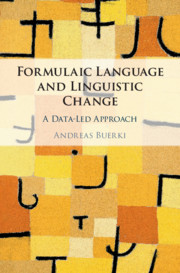Book contents
- Frontmatter
- Dedication
- Contents
- List of Figures
- List of Tables
- Preface
- Abbreviations
- Introduction
- 1 Formulaic Language
- 2 Cultural Context and Diachrony
- 3 The Data, the Community and a Data-Led Identification of MWEs
- 4 MWEs in Written German
- 5 Culture As Motivator of Change
- 6 Cultural Motivation in Context
- Conclusions
- Appendix A Filter Entries
- Appendix B Rater Guidelines on Semantic Unity
- References
- Index
5 - Culture As Motivator of Change
Published online by Cambridge University Press: 06 April 2020
- Frontmatter
- Dedication
- Contents
- List of Figures
- List of Tables
- Preface
- Abbreviations
- Introduction
- 1 Formulaic Language
- 2 Cultural Context and Diachrony
- 3 The Data, the Community and a Data-Led Identification of MWEs
- 4 MWEs in Written German
- 5 Culture As Motivator of Change
- 6 Cultural Motivation in Context
- Conclusions
- Appendix A Filter Entries
- Appendix B Rater Guidelines on Semantic Unity
- References
- Index
Summary
Chapter 5 looks at individual cases of cultural motivation of change in formulaic language. First, the functional paradigm of motivation and the methodology used to identify change are discussed. Nine detailed case studies of cultural motivation of linguistic change in action follow. These examples make a strong case for a very close link between linguistic change and changes in the culture of the speech community. Two issues raised by some of the case studies are also addressed. The first concerns the difference between merely topical fluctuations reflected in language and actual linguistic change – conclusions here show that while there is no clear dividing line, the shape of frequency developments and the type of linguistic item involved can make an intersubjective determination possible. The second concerns the issue of whether the development of MWEs explained by the behaviour of key lexical items they contain. It is shown that this is not generally the case. The case studies show that striking insights into prevailing attitudes and circumstances among the speech community are possible through the study of linguistic data.
Keywords
- Type
- Chapter
- Information
- Formulaic Language and Linguistic ChangeA Data-Led Approach, pp. 124 - 176Publisher: Cambridge University PressPrint publication year: 2020

